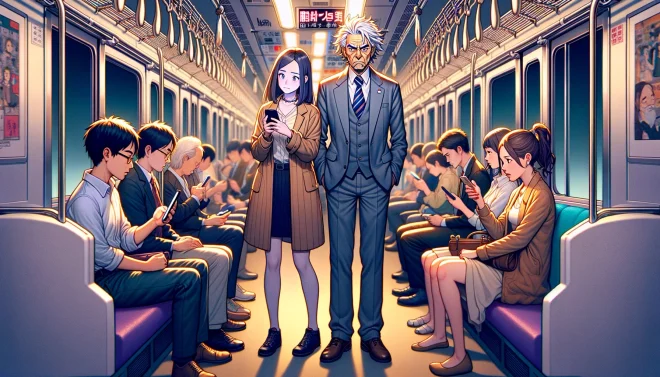
I’m Souka. After a long break, I’m resuming my posts as if nothing happened.
I’ve been wanting to share a small experience that happened years ago on the Yamanote Line in Tokyo after work.
A Sudden Event: Trouble on the Train
An incident occurred on the train home from school or work in the evening. A petite foreign woman, who appeared to be of Latin American descent, was looking at her smartphone in front of the closed train doors opposite the platform. Suddenly, a white-haired man in his 50s or 60s started yelling at her loudly, claiming she touched him with her hand.
The train wasn’t very crowded at the time, and there was a distance of about one passenger between them. Even if the woman’s hand accidentally touched the man, it shouldn’t have been enough to warrant such a loud reaction. Despite this, the man continued to yell at the woman, creating an unpleasant scene. Everyone around was shocked but chose to ignore the situation, a common response among Tokyoites.
As for me, I hesitated to intervene between them, embarrassed that I couldn’t find the words immediately. However, when the man claimed, “No one in Japan looks at their smartphones on the train,” making an absurd statement that seemed to express his discomfort with her being a foreigner, I thought that was wrong and not just a mere nuisance.
The Words That Drastically Changed the Womens’ Reactions
Then, the man insulted the foreign woman loudly, telling her to “Go back to your country, you Busu(slang for a woman with an ugly face)” At that moment, especially the young women around, who had been ignoring him, suddenly looked up. In about a minute and a bit, I was about to step in when a young woman next to me scolded the man, leaving me stunned and stationary.
The man, clearly surprised, said, “Me?” while pointing at himself. The young woman continued to confront him, and from the other side of the train, another young woman yelled, “Calling a woman ‘Busu,’ what do you mean by that?” Voices from different parts of the train began to express their disapproval of the man’s behavior.This again came from a young woman who said, “I think it’s strange that you should ‘go back to your country”
As we arrived at a station, realizing he had no allies, the man muttered something like a soulless “Is that so…” and got off the train, expressionless. This man probably grew up using the word “ugly” carelessly, an old-school “Showa era uncle” who only reads content that pleases him online, possibly a far-right ideologue, believing that the majority of Japanese share his sentiments.
[Sponsor Ad]
What this incident reveals: my own reflections
Kindness and compassion are the driving force
First and foremost, I’ve realized that you can’t understand everything just by browsing the internet. It may sound obvious, but it showed me that Japanese people and their youth are not to be dismissed. Discrimination against women and foreigners, and human rights, aren’t usually everyday topics. Often, the ones who bring up such topics, ignoring the mood, are self-proclaimed “ordinary Japanese people (i.e., netouyo).” Friends and colleagues usually don’t bother to argue against them and let it slide.
Even if it’s not discrimination or hate speech, if I had a colleague who only said things that made me uncomfortable or hurt me, I’d rather keep my distance or, frankly, run away than argue. I think that’s okay for most people. Demanding more seems unreasonable. To them, whether the other person apologizes, reflects, or even gets called out doesn’t really matter—though saying it doesn’t matter might get me scolded. The most important thing is not wanting to go through such experiences again. If there’s a guarantee that I won’t have to deal with them, apologies or such don’t really matter to me. Wanting to escape is human nature.
On the other hand, people sensitive to discrimination might see hate speech online and think it’s a “crisis in Japan,” but even “very ordinary Japanese people” find such speech unpleasant. Imagine if the internet existed during the peak of the Zenkyoto movement. The internet would have been flooded with revolutionary rhetoric, yet during that time, the LDP won a historic victory in the general election. That’s just how it is.
The kind of “crisis in Japan” rhetoric stirred up by such netouyo is something both good and bad that “ordinary” people don’t want to get involved with. It’s a nasty parody of the old left’s traditional art of crisis mongering. Rather than movements that attack others using “crisis in Japan” rhetoric like netouyo (not that it’s entirely unnecessary), I believe we should focus more on movements centered around human potential and hope, driven by compassion and empathy.
“Showa era uncle” will reflect on this
Secondly, I deeply realize that I was also a “Showa-era uncle.” As the situation unfolded, I found myself reacting strongly to “go back to your country,” whereas the young women were ignited by their reaction to “Busu.”
Certainly, both the young people and I thought those words were unacceptable. I would never use “Busu” towards anyone, especially women. But as a “Showa-era uncle,” I must admit I took it more lightly than the people today, which this incident made me realize. I’m sorry.
Writing this, ready for the backlash, seeing the angry faces and momentum of those young women, had I used “Busu” before this incident and been scolded by a young woman with such vigor, I would’ve sincerely apologized and reflected. Yet, I might’ve still thought, “It was bad, but was it worth getting that angry?” without expressing it. That’s where I need to reflect.
When there’s outrage against derogatory expressions towards women online, some quickly label it as “noisy feminists,” dismiss the need for political correctness, or mock discovering a leftist. But it’s not about that. It’s fundamentally unacceptable to belittle women. This has become common sense, especially among younger generations, transcending “human rights issues.” It’s something to be mindful of.
After the event
Readers of this blog might expect, after the man was driven out following such an incident, perhaps the foreign woman expressed deep gratitude to the surrounding passengers, creating an atmosphere as if everyone was bound by some special bond, or a “small miracle on the train” that proved everyone is equal, and mutual understanding and respect are possible.
But in reality, there was no such touching moment. The foreign woman didn’t say anything and just started using her smartphone again, as if nothing had happened, and the women who protested didn’t do anything special afterward. There was no “deeply moving atmosphere” that took over the carriage.
Nevertheless, it’s noteworthy that the victim was a woman, and it was the man’s “Busu” remark that ignited the situation, with only young women raising their voices against the man’s verbal abuse. It’s shameful for us older men, including myself. I had read articles like “What to do if you witness hate speech” and nodded along, thinking I understood, though that’s just an excuse.
However, I realized that the methods described there are a hurdle for many shy Japanese. We do not have the habit of having friendly conversations with strangers in public places.Maybe it works in Western culture. I wish someone would come up with a way to handle such situations for Japanese people. I thought about stepping in between them, but then what? My mind went blank about what to say next, as if it was all impromptu. It might have ended up in a fight. I guess I was trying to judge whether the man’s intent was hate speech. Simple and naive might be the way to go, and that’s another lesson.


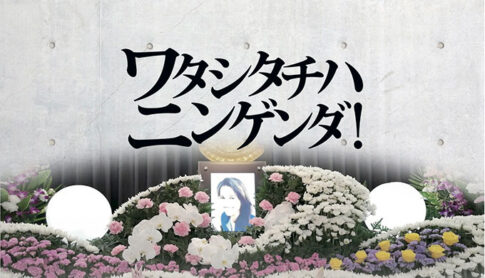



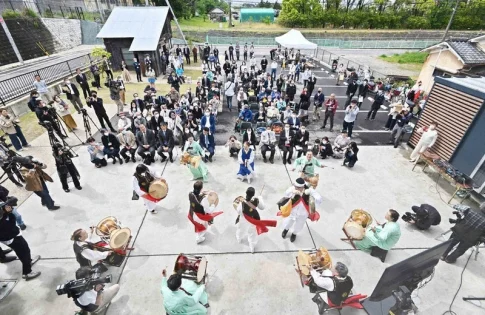

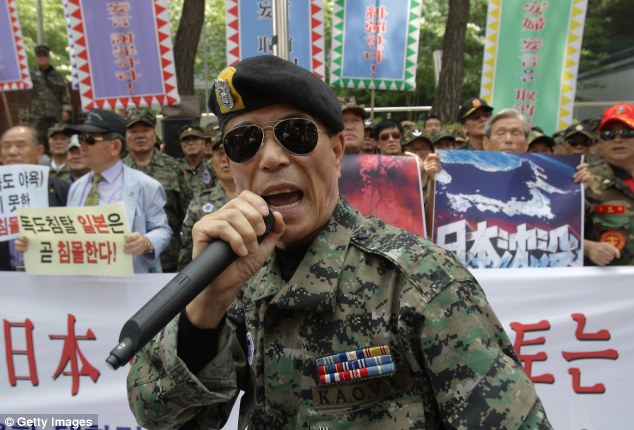

 Donations are made in Japanese yen. 300 yen is approximately 2 USD.
Donations are made in Japanese yen. 300 yen is approximately 2 USD.

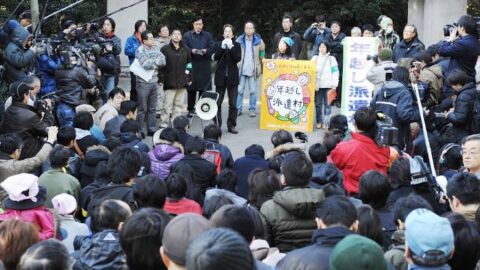
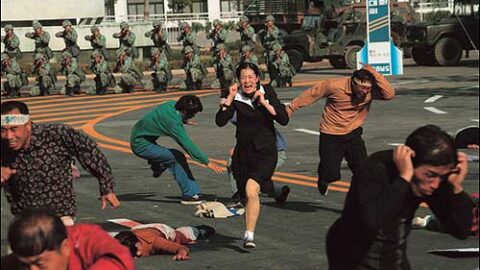
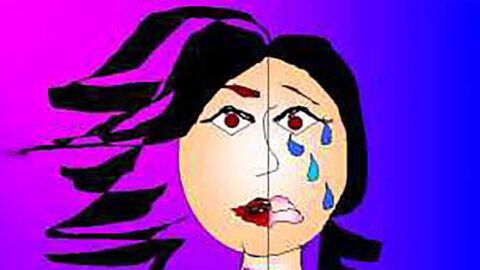
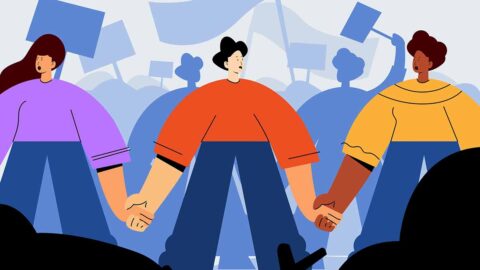
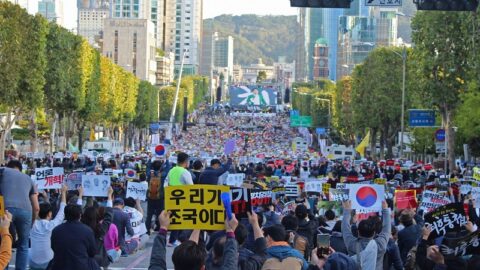
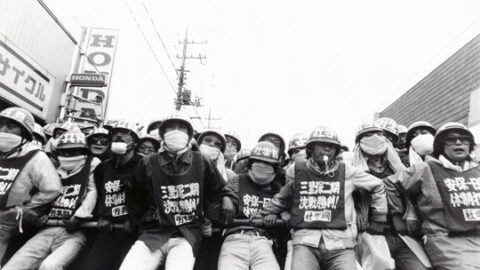


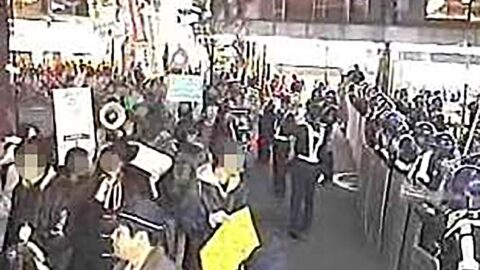


Leave a Reply